|
[Previous Page]
The Map.
――♦――
CHAPTER VIII.
THE Leeds Mill
and Store Society, arising in Duncan Street Coffee House, in 1847,
has spread like the civilisation of Rome, not "o'er continent and
sea," as Rogers sang, but, beyond all expectation, over Leeds, its
suburbs and vicinity. When I met the directors to examine the
geographical position of their great trading organisation, the
Society's architect, who was present, exhibited two maps, one of
ordinary size, and one on a much greater scale, which was necessary
to enable the stores to be displayed in one map, which then was too
large for handbook use. A third map, on a special scale, had
to be constructed, in which all the stores in the city of Leeds
could be shown, in a conspicuous way, easy to be traced. The
plain, distinctive figures on the map enable any store to be at once
identified. The stores in outlying districts and towns have
their position indicated, and the geographical directions in which
they lie. These entire 80 stores (which, however, are not the
whole of the Society's places of business, as will be seen by the
table of branches following) spread over an area of nearly 200
square miles. Some have compared the Society to an octopus,
whose tentacles extend from Albion Street over all the circumjacent
land. But it is no octopus of the kind Victor Hugo has
described. The Leeds Industrial Octopus is not devouring, but
bestowing, fertilising, feeding, and enriching all whom it reaches.
The Branches.
――♦――
CHAPTER IX.
HERE in
alphabetical order the member can find the birthday of any store to
which he belongs. When I was taken a tour of the branches I
began to make notes on their points of distinction. A second
day, with the aid of a cab, was insufficient to visit all those of
interest. Indeed it requires a week to circumnavigate the
whole of Leeds store-land, and my notes would fill this handbook if
they were written out in full. So Mr. Fawcett has compiled for
me the bird's-eye table of all of them, showing when they were
opened, when new memorial stones were laid, who laid them, and other
facts of their history.
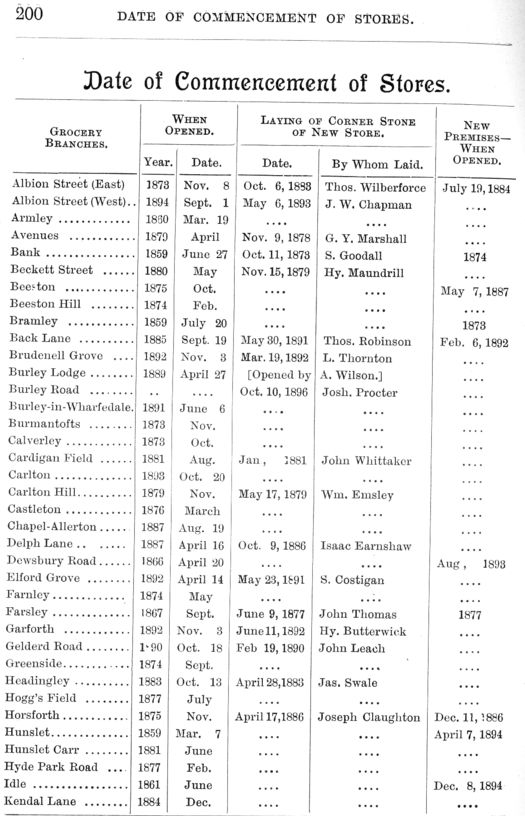
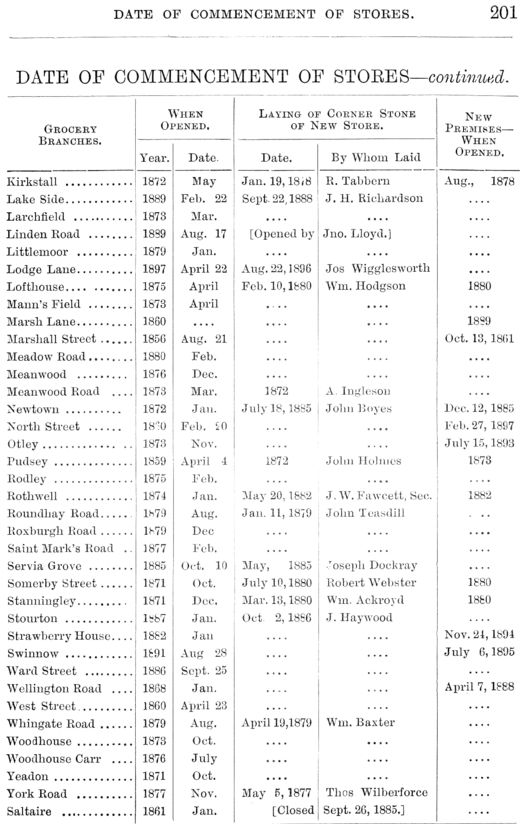
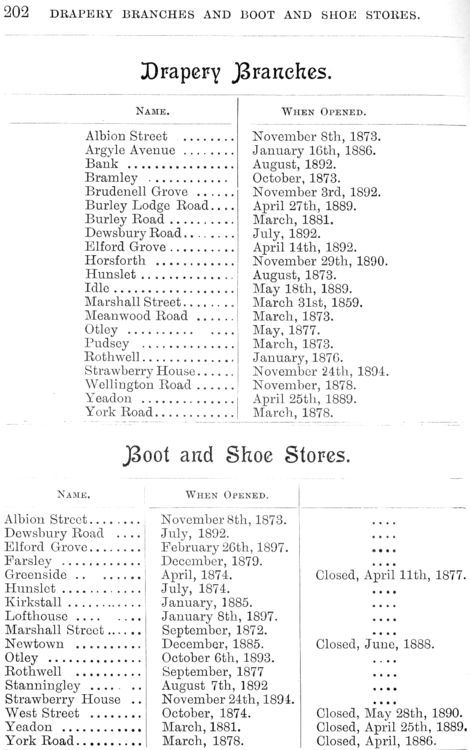
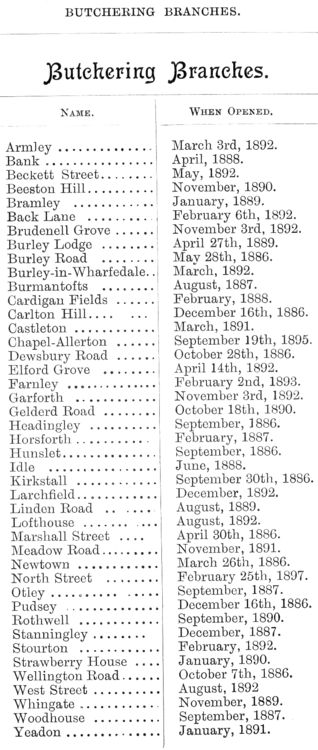
The aim of the Society is to have the branches
half a mile apart so that they may not overlap, and no member has
more than a quarter of a mile to walk to his store. Where the
population is dense it is found advantageous to have the stores
nearer. Outlying stores vary from five to twelve miles apart,
and as there are eighty branches he who visited the whole on foot
would find that he had a walk of nearly forty miles before him.
A cyclist visitor would need a local road map to aid him if he ran
round to them all.
Next to "Strawberry House," the name which most interested me
was "The Bank." That seemed an entirely profitable place; but
I found it was a district which would be better were it rebuilt, and
parts of it would bear being made more sanitary. The working
portion of the population appear to have no account at any bank,
unless they have joined the store there, which has, as all stores
have, a profit bank from which members can draw money out who put
nothing in, save their custom.
The Cricket Field Estate at Armley, has a fine terrace
(Mitford Terrace), built by the Society. The houses were all
sold before they were finished at £255 each. A refreshing terrace it
is—no wonder it is sold; but forty more houses are planned. The
Methodist New Connexion have erected a pretty church on a freehold
plot sold to them by the co-operators, where prayers ascend to
Heaven amidst sweet air, which must give the worshippers pride.
In recording the erection of tenements it is frequently said that
those put up by the Society are "through houses." To a stranger
this may need explanation. The term "through house " is used
when the house opens into two streets—back and front. The working
classes of Leeds generally live in what are termed "back to back"
houses—that is, dwellings containing living-room, small scullery,
cellaring underneath, and two or three bedrooms above, but with only
one opening into the street. A through house usually has a
sitting-room in addition. At Hunslet I had the pleasure to congratulate Mr. George Oliver, the
boot storekeeper there, on the success of his son, Ernest Oliver,
who won the Neale Scholarship. Leeds took interest in
promoting that scholarship, and it is right, as well as gratifying,
that it should be held by a Leeds youth.
A store in Hunslet had an ingenious manager who knew how to compose
a label and how to write it neatly. A card on beef, or butter, or
bacon, said "Really fine," "Very choice," "Delicious," "Take the
piece," "Pick of the market," "Fit for a Queen." Anyone looking in
the window felt he could not do very wrong in buying something.
Every label kept clear of the egotism of the shopkeeper— "Buy our pickles," "Our speciality is buttermilk."
The Holbeck Works were a good day's work to go over. I should not
have objected to a week's engagement for inspection, as I found they
paid trade union wages and work only the recognised
number of hours per week. The Society's wholesale storerooms—the
Feeding ground of the branches—were a sight to see; a succession of
food chambers about 70 yards in length. The
countless rows of hams daintily suspended in compartments of white
wood, might tempt a vegetarian to falter in his wholesome faith. Though I saw but half there was to see, I was hungry for a
week after. But if I told everything of every branch, the reader
might not live to the end—and would not forgive me if he did. As the
reader has seen the first flour shop he ought to see the last
branch—the new stores in Burley Road, not quite completed—comprising
drapery, meat, and boot departments. It is a bright, obvious
business structure such as purchasers love to see.
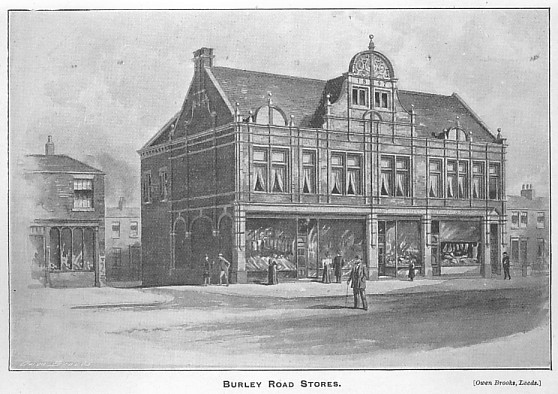
The Secretaries.
――♦――
CHAPTER X.
A GOOD secretary
is as the keeper of the Queen's conscience, since he keeps the
conscience of the Society. He generally knows what it ought to do,
and always knows financially what it can do. Following is a list of
the secretaries of the Society so far as they are known:—
1847.—Mr. Emmerson.
July, 1849.—G. R. Thomas.
June, 1850.—Edwin Gaunt, to 1853. [13]
June, 1856.—William Emmerson.
January, 1858.—W. Bower—James Prentis, clerk.
June, 1858.—James Prentis, to 1874.
1874.—W. Benson.
1874.—S. Slater.
May, 1874.—William Swallow, to about May, 1880; and then Mr. J. W.
Fawcett, the present secretary.
EMMERSON.—Mr. Emmerson, who has elsewhere
been described, had been a schoolmaster, and with many excellent
qualities he retained his pedagogic habit, and sometimes treated the
members with the peremptoriness then thought becoming in a
schoolmaster, which the members—not being children—resented, and so
trouble came. This was the only ground of the strong
difference of opinion regarding him, to whose intelligence,
fidelity, and great service, the prosperity of the Society in his
day (1847-1856) was a good deal owing. This came to be
discerned, and he received the respect due to many merits.
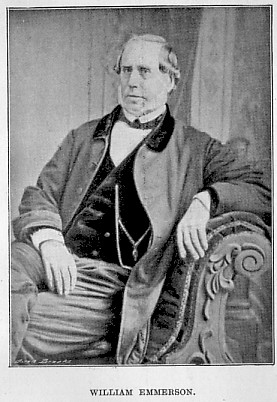
FAWCETT.—Mr. John W. Fawcett, who has
exceeded all secretaries in the length of time he has held the
office, was of Leeds birth, and inherits the energy and capacity for
work characteristic of Leeds men. He was born on August 30th,
1844. Being one of a family of eleven children, of limited
income, early activity befel him. Taking interest in the
affairs of the Society, he was elected on the local committee of the
Bank Store about the year 1870. Mr. Hunn, who afterwards
became manager of the coal department, was then storekeeper of the
Bank Store. It may truly be said that Mr. Fawcett never sought
office, but on each occasion was pressed into service. He
appears to have had a passion for work, and was content with that
pleasure where he was. He was pressed to join the Board, and
his name appears among the directors in 1872. Afterwards he
was invited to fill the place of auditor, which he held for a short
period. At that time a rearrangement of the office staff took
place, and the directors advertised for a cashier. There were
seventy-five applicants, but Mr. Fawcett was not one; but when the
Board had to make a choice, they had difficulty in selecting a
suitable person. Some appeared to think that Mr. Fawcett was
the kind of person they wanted. During their deliberations Mr.
Fawcett was auditing in the office below the Boardroom. One of
the directors came to him and asked him to allow his name to be
placed on the list of applicants. At first he refused,
believing that if his name was added to the list it might impair the
chances of one applicant personally known to him—a very generous
reason for declining. Learning afterwards that his
acquaintance had withdrawn his name, Mr. Fawcett gave his consent,
and within the hour he was informed he had been elected for the
post. This was how Mr. Fawcett became cashier in May, 1874.
In 1880 he was appointed secretary on the retirement of Mr. William
Swallow. Mr. Fawcett's integrity and devotion have commanded
the highest estimation of the Society. In addition to editing
the monthly Record he has served on the committee of the
Newspaper Society, at present represents the North-Western Section
on the Central Board of the Co-operative Union, and has been
ceaseless as an advocate far and near. The stranger finds in
him accessibility—the charm in an officer where it exists. His
energy is an unusual quality, for energy is often self-sufficient
and abrupt. Mr. Fawcett has a youthful alertness; there are no
wrinkles in his heart—the worst place in which they can appear.
They add dignity elsewhere, so long as they keep clear of the mind.
On Mr. Fawcett's recent recovery from a serious illness he was able
to attend the conference at Burley, on July 24th, where he received
an enthusiastic reception. The reader sees adjoining his
eager, animated face, looking well at whatever may be before him.
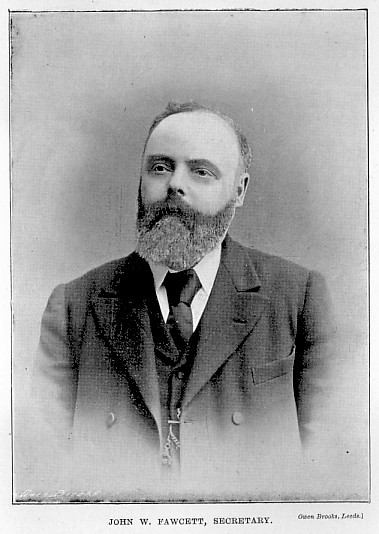
GAUNT. Edwin Gaunt (or Sir Edwin
Gaunt), happily still lives to witness the great prosperity of the
Society of which he was once both secretary and advocate. His
reports had a brilliant aggressiveness in them in days when
defensive arguments were invaluable. He had in his mind a
standard of the movement higher than that in the minds of the
members. Sir Edwin Gaunt was one of the first secretaries of
the Society, from June, 1850, to 1853. Being Mayor of Leeds,
1887 (Queen's Jubilee Year), he was knighted. He is a hat,
cap, and clothing manufacturer. The circumstances of Sir
Edwin's early youth were such that he owes all his distinction to
his own endeavours, aided by the excellent foresight and judgment of
Lady Gaunt. In the days when he was connected with the Society
he was intimately associated with Mr. Hole and Mr. Holmes, and
like-minded spirits, which showed he had high qualities of his own
to have commanded their regard. There is force of character as
well as civic dignity in the portrait annexed.
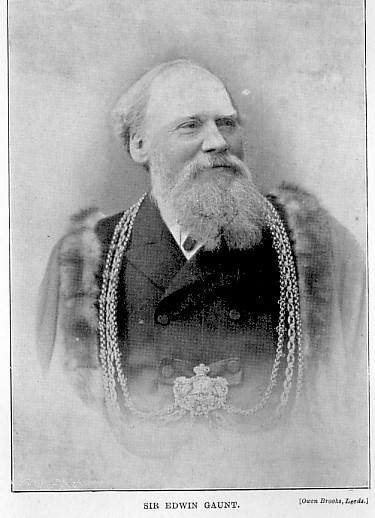
PRENTIS.—James Prentis, whose son is the
present secretary of the large Huddersfield stores, entered the
service of the Society in 1857, was appointed secretary in 1858, and
held the office until 1874. Mr. Prentis was in the employ of
the Society 30 years. In 1858 (June 30th) he prefaced the
report of the directors by a brief address to members, which shows
practical knowledge and good sense beyond the average of his day.
The business mind and the co-operative mind were blended in him,
neither extinguishing the other. He held a high place in the
regard of the Society, and in September, 1888, a purse of £20 in
gold was presented to him, he being then in his 79th year.
SWALLOW.—William Swallow, when a youth,
was employed as a junior clerk in the office of the Society.
For a considerable time he was a clerk in Tetley's Brewery. He
was appointed one of the auditors of the Society, and in 1874
secretary, which he held until 1880. He has now a considerable
practice as an accountant, and is auditor for a large building
society and many co-operative stores. He has acknowledged
ability both as a speaker and writer. He has continued an
influential member of the Society, fertile in suggestion and forward
to represent its interest in Congress or on the platform.
The Presidents.
――♦――
CHAPTER XI.
MANY think that a
government of the wise would be a good thing, but such government
has this disadvantage—it prevents anyone else being wise. Leeds has
had a series of presidents who have enabled the members to acquire
wisdom by sharing experience. It is a great quality in a president
to maintain friendliness among members and to show respectfulness to
all who desire to speak. Whoever feels himself slighted, or put
down, is alienated. It is possible to enforce brevity and relevance
with firmness; but firmness without fairness does not go for much. A president who stands
"four square" is all the better if he has a
Salamander mind, and can stand fire.
THE PRESIDENTS AND THEIR TERM OF SERVICE.
1847.—John Smith.
1848.—John Smith.
1849.—J. Terry Taylor.
1850.—Jas. Booth.
1851.—W. Eggleston.
1852.—Joseph Mathers.
1853.—John Carter.
1854.—Samuel Sands.
1855.—J. Terry Taylor.
1856.—W. Crowther.
1857.—J. Speed (six months).
1857.-Samuel Haigh (six months).
1858.—N. Nussey.
1859.—Samuel Haigh.
1860.—W. Bell.
1861.—W. Wildridge.
1862.—Jno. Hunt.
1863.—W. Bower (three months).
1863.—John Holmes (nine months).
1864.—John Holmes.
1865.—W. Wildridge (six months).
1865.—John Speed (six months).
1866.—John Speed (twelve months).
1867.—H. Nicholson (six months).
1867.—J. Speed (six months).
1868.—T. Newman (six months).
1868.—J. Geves (six months).
1869.—W. Wildridge (twelve months).
1870.—J. Speed.
1871.—W. Bell.
1872.—A. Ingleson (six months).
1872.—J. Speed (six months).
1873.—J. Speed (six months).
1873.—R. Tabbern (six months).
1874.—R. Tabbern (six months).
1874.—John Thomas (six months).
1875.—John Speed (six months).
1875.—S. Goodall (six months).
1876.—S. Goodall (six months).
1876.—W. Jones (six months).
1877.—T. Wilberforce (six months).
1877.—J. B. Baldwin (six months).
1878.—T. Wilberforce (six months).
1878.—John Teasdill (six months).
1879.—G. J. Marshall (six months).
1879.—W. Bell (six months).
1880.—W. Bell (twelve months).
1881.—W. Bell (twelve months).
1882.—W. Bell (twelve months).
1883.—T. Wilberforce (twelve months).
1884.—T. Wilberforce (twelve months).
1885.—T. Wilberforce (twelve months).
1886.—T. Wilberforce (six months).#
1886.—J. Dockray (six months).
1887.—J. Dockray (twelve months).
1888.—J. Dockray (twelve months).
1889.—J. Dockray (six months).
1889.—Isaac Earnshaw (six months).
1890.—Isaac Earnshaw (six months).
1890.—John Leach (six months).
1891.—John Leach (twelve months).
1892.—John Leach (twelve months).
1893.—John Leach (six months).
1893.—Lionel Thornton (six months).
1894.—L. Thornton (twelve months).
1895.—L. Thornton (twelve months).
1896.—L. Thornton (six months).
1896.—James Tetley (six months).
1897.—James Tetley.
BELL.—William Bell was born March 1st, 1819, at Poston, near Driffield. He joined the Society in 1853; in 1856 he was elected on
the Board of Management; in 1860 he became president, also in 1871
and 1880. The son of a rural labourer, who had a wife and eight
children to support on wages of 12s. a week, young Bell had no
advantages in early youth. He had the persistent voice of a
Scotchman, and those who did not know to the contrary believed him
to be of that nationality. He had also the Scottish love of
knowledge. As a public speaker he had the eloquence of experience,
was an influence in Liberal politics, and his advocacy could always
be counted upon by his party. But his principal spare time and
strength were given to co-operation, for which he had an enthusiasm. For twenty-seven years, until his sudden death, Mr. Bell was an able
and continuous promoter of the Society. He had acknowledged ability
as manager in a bolt and screw factory. Mr. Bell was the originator
of the Educational Committee which consisted of seven or eight
members, but only had a grant of £20 to advance their object.
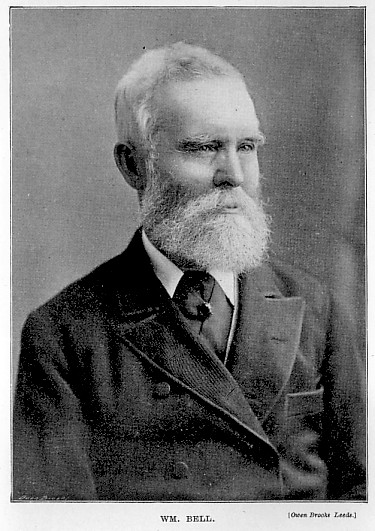
DOCKRAY.—Joseph Dockray became a member of the Society about thirty
years ago, and took an active interest in the movement for many
years, speaking frequently at meetings
indoor and the open air. He was elected a member of the Board in
1881, elected president in 1886 and again in 1887 and 1888. Elected
again as director in 1889 and continued in office till 1894, when
the time limit for serving as director rendered him ineligible for
re-election for a time. Altogether he served as director and
president about twelve-and-a-half years. Always conspicuous for
zeal, courage, and ability.
EARNSHAW.—Isaac Earnshaw, born in 1840 at Beeston Royds, was sent to
work as a half-timer at eight years of age. He afterwards went to
the Kirkstall Forge; was a bank messenger in Leeds, and caretaker
for many years of the offices of the Royal Insurance Company in Park
Row. He was one of the managers of the Skyrack and Morley Savings
Bank, and was always a man in whom confidence could be put. He was
chosen to succeed Mr. R. Tabbern as the Labour representative on the
Leeds School Board. In 1872-4-6, and again in 1882, he was a member
of the Board of Directors of the Society, and in 1889 president. His
death and character have been recorded in the Chronicle of 1897.
HOLMES.—John Holmes, one of the earliest and latest friends of the
Society, carried on for many years a successful drapery business,
from which he retired with a moderate fortune many years before his
death. When last lecturing for the Leeds Society, Mr. Holmes came up
from Methley to renew old comradeship with the writer in the cause
of co-operation, in which Mr. Holmes's interest never abated, and his
services were always at command as long as he had strength to render
them. He was prophet and pamphleteer, and had a buoyant enthusiasm
which sometimes excited mirth, but his earnestness and vivacity
gave him an abiding place in the respect and admiration of all who
knew him. Near or far, he spoke on any platform where co-operative
listeners could be addressed. He had admiration for art, and heresy
in his taste for pictures, of which he was unconscious. But it was
his merit to be an enthusiast for art, when few persons of the
middle-class engaged in trade were so. He was the most vivacious of
all the presidents of the Society.
HUNT.—John Hunt was born May 4th, 1819, being now in his 79th year. He joined the Society in 1848 by arrangement. His wife's uncle held
two shares, who let Mr. Hunt have one.
Membership was limited then, and those out could only get in by
diplomacy. Mr. Hunt had just married, and like a prudent husband, or
probably having a prudent wife, his thoughts were turned to
co-operation as a means of improved income. The committee met in a
Temperance Coffeehouse in a yard near the bottom of Briggate. About
that time the present writer lodged at it on some lecturing visits
to Leeds. Coffee-houses in yards were very common then.
In 1849, Mr.
Hunt was elected on the Board of the Society. Among his colleagues
he remembers E. Gaunt, W. Eggleston, R. Penrose (a name promising
bloom), N. Nussey, John Speed (another name of good omen in a rising
society), R. M. Carter, and W. Emmerson, secretary. This was a true
committee of the time, for it held propagandist meetings to explain
co-operative principles, and take down names of any willing to join
the Society. These propagandist meetings were not public meetings,
but held mainly in coffee or temperance houses, where working men
frequented. Mr. Hunt had been employed as superintendent of the
shipment of grain from railways to river warehouses. Thus he
acquired a practical knowledge of the classes and qualities of
wheat, and was able to be of use to the Flour Society. He knew what
kinds millers bought, and why they bought them. From 1849 to 1857 he
continued actively engaged in the affairs of the flour mill. During
that time there were many stormy meetings. Fortunately the committee
always had a majority of members of common sense and reasonable
confidence to support them. Business obliged Mr. Hunt to go to Skipton for three years. He then returned to Leeds, and was
president of the Society in 1862. During his residence in Skipton he
continued his membership of the Society, and dealt with it.
LEACH.—John Leach is a Newcastle-on-Tyne man, where he was born in
March, 1837. When a young man he went to reside in Middlesbrough,
and came to Leeds upwards of thirty years ago. He shortly after
joined the Society, of which he has been an active member, serving
as a local committee-man and for several years on the Board of
Directors. He was president in 1890 and was twice re-elected,
holding the office for the full term of three years. He is well
read, entirely intelligent, and a good speaker. Mention has already
been made of his services. When a few years ago the writer had
the pleasure to deliver a series of lectures to the Society, Mr.
Leach's interest in social education was very manifest; it was not a
sentimental but a real practical interest, nor was his zeal abated
by the trouble it imposed upon him, nor by the uncertainty of the
funds which then fell to the committee.
NEWMAN.—Thomas Newman was an old member of
the Society, and between 1860 and 1870 was several times elected on
the Committee of Management. In 1868 he became president.
At his death in September, 1885, Mr. (since Sir) John Barran, M.P.,
unveiled a memorial to him in the Burmantofts Cemetery, subscribed
for by the members and friends of the Ancient Order of Romans.
NICHOLSON.—Henry Nicholson became a member of the
Leeds Industrial Society at its commencement (1847). His
number was 675. After business was commenced it was found more
money was needed, and each member was called upon to take another
share, and look for someone to take it. Mr. Nicholson's second
share was No. 1,321. He sold his share "675," and retained
share "1,321," which he still holds. Amidst all the ups and
downs of the Society he has stuck true to it, and believes he has
never had one pound of flour from anywhere else since the Society
commenced to sell. No idle spectator he, but undertook the
duty of a visitor to West Street, Queen Street, Bank, Marsh Lane,
Marshall Street, Armley, Bramley, Pudsey, Farsley, Idle, Saltaire,
North Street, and Clifford Stores, and, for a time, visited several
once a month, to see if all were going on right. Taking stock
and visiting the stores were all voluntary work. He has served
more than 12 years as president (six months 1867) and director.
Having been on the board with 24 directors and with 12, he believes
that the business of the Society has been much better managed with
12 than with 24. His final and only protest is against stores
selling beer. Mr. Nicholson's career has been one of
ungrudging industry in co-operative service and in unchanging
loyalty to the cause. Having been Grand Scribe of the Sons of
Temperance for 30 years, he was in 1895 presented with an
illuminated address and a purse of gold.
NUSSEY.—N. Nussey, who was president in 1858, is
remembered for excellent humour, sound practical common sense, and
eloquent persuasive force—not common qualities,
and valuable in days when turbulence was a frequent form of
co-operative interest.
SPEED.—John Speed was several times president of the Society between
1857 and 1875. During the time when the Society was compelled by law
to have a treasurer, Mr. J. Speed filled that post for many years;
he guarded the finances of the Society and watched its expenditure
as carefully as if it had been his own. When the law was altered, so
that the Society did not require a treasurer, he was generally
either president or a member of the directorate. It was no unusual
thing, when any money was to be injudiciously voted by the members,
to see Mr. Speed step to the front of the platform with his arms
folded, and in his most impressive manner caution the members to
think well before they gave their votes. The members had such
confidence in his judgment in money matters that he many times saved
the Society from loss. On his death, in 1879, the members instructed
the directors to present to Mrs. Speed an illuminated address of
condolence on her great bereavement. He was sincerely
respected for the regularity and punctuality of his habits and
strict uprightness of conduct. For thirty years he was
Inspector of Weights and Measures in Leeds. He was a Liberal in
politics, and attached to his party; he could put an argument
lucidly and not without humour. Sagacity, integrity, and decision
may be read in the portrait of him.
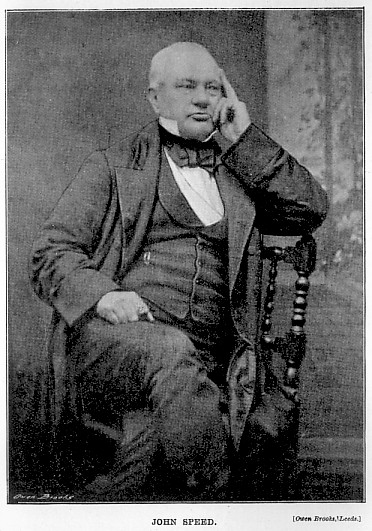
TABBERN.—Richard Tabbern, president in 1873-4, was a Bolton man, and
was foreman or manager of one of the departments of the Kirkstall
Forge. He was the Labour representative on the Leeds School Board. With the exception of six months, he was a director of the Society
from the middle of 1872 to 1880. In 1880 he was appointed Clerk to
the Board. He was nominee of the Leeds Trades Council, and was one
of the "victorious eight" in a famous contest. He was but 56 at his
death, April 12th, 1889. His interest in the wisdom of members was
constant. In 1874 he reported that "the Educational Committee were
putting their intermittent grants to good account, and were
endeavouring to establish news and reading rooms in all the
districts." He was among the earliest to acknowledge the services of
the "various local committees for the very efficient aid they had
rendered in furthering the interests of the Society."
TETLEY.—James Tetley, like Mr. Earnshaw, was born in 1840, but Mr.
Tetley's birthplace was Bradford. Like all the presidents and
memorable workers who are recorded in these pages, Mr. Tetley owes
his distinction to himself. Not only was there nothing in his favour
in his early days, but every thing was against him. At the age of
nine he went to work in a factory. The chief incident in his mind up
to that time was certain rejoicings at Pudsey (where his family then
was) at the Repeal of the Corn Laws, which many families had glad
cause for remembering. Afterwards he worked in a Bradford factory
until he was thirteen. At the time of the Crimean War trade was
depressed; his father died leaving young Tetley's mother with ten
children, five younger than he. His apprenticeship was completed at
Joseph Rhodes's, machine-maker, Morley. He became a member of the
Amalgamated Society of Engineers, having to go four miles to
Dewsbury to find a proposer and seconder, there being no trade union
in Morley then (1863). From 1864 to 1896 he had employment at
Messrs. Gannett, Walker, and Co., engineers, Hunslet, Leeds. Always
for union and improvement, he held various offices in the trade
organisation to which he belonged, and represented it on the Leeds
and District Trades Council, and represented the working engineers
on the Conciliation Board, until co-operative duties took up all his
spare time. In the meantime he had the good judgment to attend the
First Course of University Extension Lectures on Political Economy,
that he might form sound opinion on trade questions. On his first
coming to Leeds he was invited to aid in forming the Hunslet
Perseverance Co-operative Association, which, lacking essential
agreement, did not succeed; whereupon Mr. Tetley joined the, Leeds
Society—which has known so well how to succeed—in which he has
served on local committees, educational committees, board of
directors, and twice as president, being elected the second time
unopposed, whereby he has the well-earned honour of being the
president during the Jubilee year. Mr. Tetley's record has been one
of industry and progress, of persistent and intelligent
perseverance, always taking interest and forwarding measures
calculated in his judgment to benefit the masses, both municipal and
imperial.
THORNTON.—Lionel Thornton was born in December, 1852, at Oldham,
Lancashire, and was removed to Leeds in 1857, where he has resided
ever since. Like so many others, recorded in these pages, he
commenced work early, at the age of 10 years, as a wherry boy in the
employ of the N.E. Railway Co. At the age of 12 he had the
misfortune to lose one of his legs at the nail works, Whitehall
Road, where he had gone to seek for orders. Worked for Messrs. J. Hattersley and Sons, Armley Road, 21 years. Married, in 1878, Annie
Elizabeth, daughter of John and Elizabeth Jackson. Joined the Leeds
Society in 1879, and in 1882 was elected a member of the local
committee for Oak Road Store, and served for some time as secretary
to the local committees of Wellington Road District. On the death of
Mr. Tate, in May, 1889, he was chosen to fill the vacancy, and was
re-elected until 1893 without opposition. The whole of the time he
was a director he served on the mill committee. For two years he was
chairman, and was elected president in July, 1893, and re-elected
1894 and 1895 without opposition. When but nine years old he
attended the Methodist New Connexion Sunday School, St. Philip's
Street, where he continued until 1889. He became secretary (at 16),
teacher, and superintendent. He was put on the preachers' plan, and
was much esteemed as a local preacher. In the temperance cause, in
friendly societies, he is interested and active, and as a
trade-unionist he is for the worker having a living wage. On laying
the memorial stone of a new store in Brudenell Grove (1892) he was
presented with a timepiece and writing desk, and Mrs. Thornton was
given a silver tea service.
WILBERFORCE.—Thomas Wilberforce, rightly named, there beings force
in his character, is undoubtedly a Yorkshireman, being born at
Kirk Ella, in the East Riding. His father was a Chartist of the old
type, who said what he meant and meant what he said. In 1875 his son
became a director, which implied, as it had done years before, a
good deal of work and very little credit. Thomas Wilberforce had
wisely taken such opportunities, where information could be had, as
were open to working men in his time. One of them was the Debating
Class at the Working Men's Institute; here he acquired the power
which only debate can give of mastering the facts of his case.
Having a voice which needed no effort to hear it, nor
indeed could any effort prevent those present from hearing it, was a
great missionary advantage to him on the platform. In 1877 he was
elected president, and for the second time in 1878. At that time
presidents were elected for six months, subsequently the term was
made twelve. In 1882 Mr. Wilberforce was elected again, also in
1883, 1884, and 1885. He has held numerous representative
appointments on the Central Board, and at congresses, elsewhere and
otherwise. It was he who laid the corner stone of the new Central
Stores in Albion Street, when he was presented with a gold watch and
guard, a black marble timepiece with bronze pillars, two vase
ornaments to match, and a portrait of himself. On his retirement
some time ago, the managers and officials of the Society presented
him with an illuminated address, expressed in terms which he highly
values and may justly do so. For liberal political and social
service, Mr. Wilberforce is counted in the press as one of the "Celebrities of Leeds."
Financial Progress.
――♦――
CHAPTER XII.
ELSEWHERE in
these pages when figures are cited, the rule of the writer has been
to give them as nearly as possible in round numbers. Thousands
and half-thousands give the reader a comprehensive idea of the
values in question, but odd hundreds, or fractions of hundreds, slip
from the mind. The official accounts of the Society are
accurately stated down to farthings; but what reader ever remembers
shillings or pence or farthings, and what does it matter if he
forgets them? It is the bulk sum only which impresses or
informs him. When Douglas Jerrold, lunching at a hotel, had
salad served him, which contained an excess of gritty particles, he
asked the waiter what it was. "Salad, sir," was the answer.
"No," said Jerrold, "it is a gravel walk with a good many weeds in
it." Fractions of pounds, shillings, and pence are the gritty
parts of a financial salad. They are left out in the
chronicle, that the edible portion may be better available for the
enjoyment and digestion of the reader. Fractions, however, are
the natural nutriment of the auditor, and in the following table
they abound in their native luxuriance, indispensable in a tabular
statement of finance.
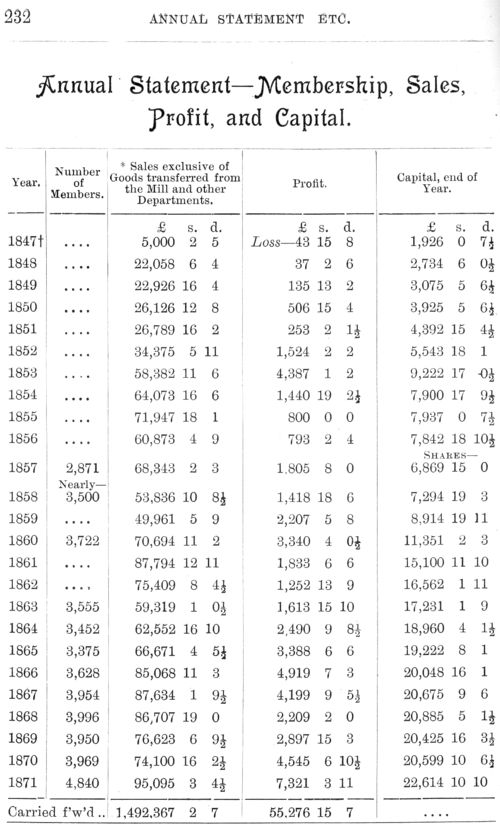
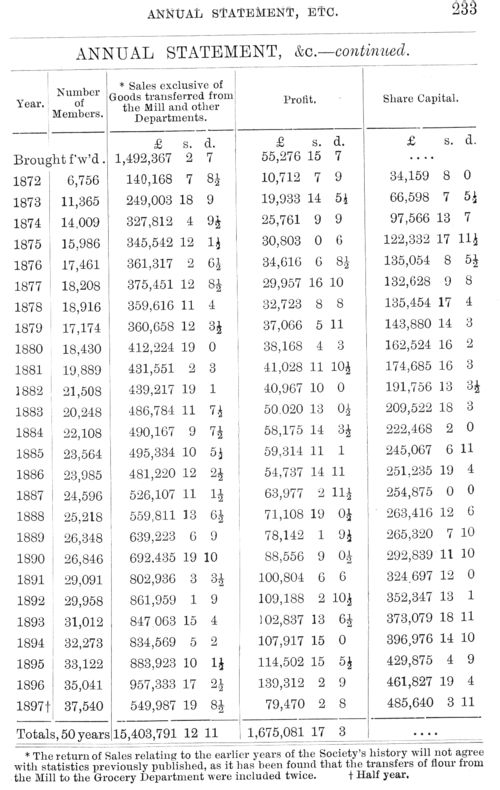
This comprehensive and authentic table will
enable the reader to see at a glance and understand what the
progress of the Society has been definitely. The affairs of
the Society have been given in a hundred bi-annual reports which
cuts the progress of the Society into two, and the reader sometimes
has to perform an act of retrospective calculation to be quite sure
what the yearly advance—whether by leaps or bounds or both—has
really been. But no doubt will exist if he peruses the "Annual
Statement of Membership, Sales, Profit, and Capital," which Mr.
Fawcett has prepared for this chapter. Two committees are
concerned with these enticing results. First, the Finance
Committee, which have in their charge the "main chance," and
certainly look as though it would not escape them, which it is apt
to do unless vigilantly watched. The duties of this committee
are mainly to find outlets and safe investments for the capital of
the Society, by the purchase of land, the erection of stores and
other buildings required for conducting the Society's business.
Cottages and houses for members come under their consideration.
In addition to the building department, they have the supervision of
the office, of the drapery and check departments, the managers of
which meet the committee from week to week.
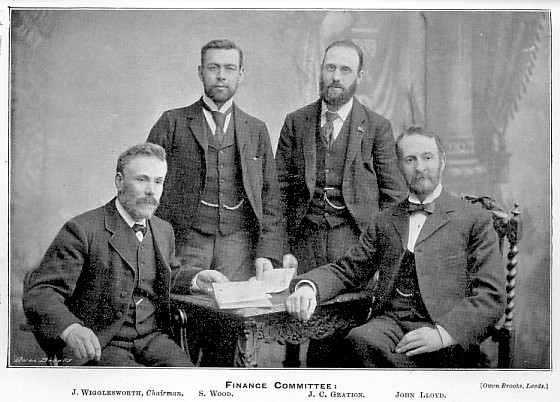
These are no mean duties to discharge, as anyone
will find who thinks over them. Members are not always
conscious of the amount of thought, care, and labour which are being
incessantly rendered on their behalf, and which deserve appreciation
and regard.
The Grocery Committee, as that title indicates, have the
general supervision of the grocery department, and, in addition,
look after the furnishing, boot and shoe, bakery, brush-making, and
cabinet-making departments. They have the managers of these
businesses before them regularly. This committee have a
considering, watchful, outlook expression, which bodes well for
efficiency.
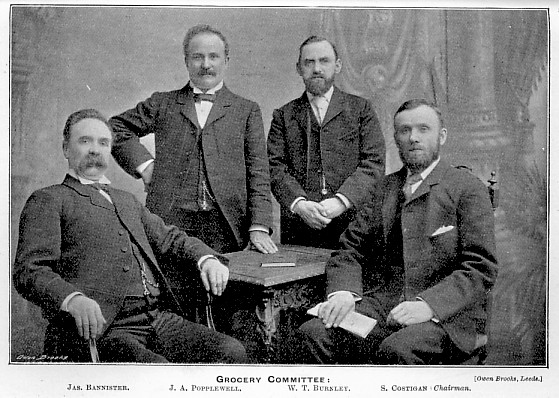
The next plate represents an important group of
officers. The managers of departments are the practical agents
of business prosperity. It is in their power to inspire or
decrease the enthusiasm of members. Tact—that indefinable
quality which means the power of doing what can best be done, where
an instantaneous decision has to be taken in personal affairs,
accessibility which delights the humblest member, and gives him
confidence to ask questions upon which his interest in the Society
depends—patience, and readiness to oblige, so difficult to maintain
under the pressure of business, and infinite repetitions of the same
question by different persons. These are few of the qualities
a manager need possess, and will deserve a prize medal if he does.
Suggestiveness to the committee as to how business may be increased
or improved, taste in the disposition of the commodities under their
charge, are other qualities. But to name them all would be to
write a manual of management. In the plate are portraits of
the whole of the managers, eighteen in number.
|
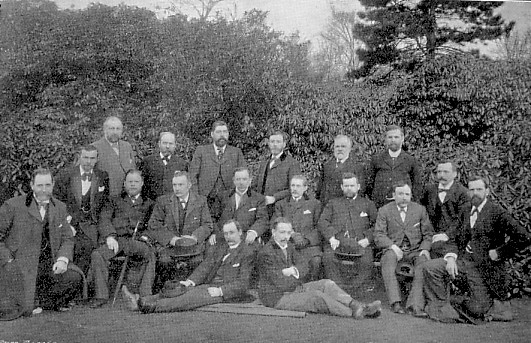 |
|
The Managers of the Society.
G H Breton, E Hutton, W K Dean, A
L'Amie, J Briggs, B Bikerdike.
P Rump, W Shaw, F Rust, J Swallow,
R Whalley, A Cooper, H Smith, C Dawson, E
Wilkinson
H Gledhill, W T Fielding |
The Leeds "Record."
――♦――
CHAPTER XIII.
A LOCAL Co-operative Journal is a
necessity of the Society, as soon as it can be afforded. The
Leeds Society has had such a Journal since 1878. Its name is
the Leeds Co-operative Record. The object of such a
publication was excellently stated as "intended to supply a
medium of communication between members of the Society and between
the various sections of it, that suggestions and criticisms intended
for its improvement might be known and considered within the Society
without carrying them to outside papers," and inviting alien opinion
upon "what concerns the Society alone."
This object has been well fulfilled. The qualities of the Record are
effectiveness of statement, justness of criticism, efficiency in
reporting, and discrimination in presenting relevant facts. This
much was written long before the writer knew that Mr. Fawcett had
been the editor. It did not seem possible that with the duties of
general secretary anyone could perform onerous editorial work unless
he had unusual energy and industry.
For myself, I have long had a prepossession in favour of the Record. My address as President of the Carlisle Congress was the subject of
many reports and comments. The best of all was that which appeared
in the Leeds Record, September, 1887. The only form of praise which
has permanence in it is that in which things said or done by a
person are cited. All praise is barren without examples. The things
done or the things said may be open to objection, or excite
difference of opinion, but the reader knows what he goes upon in
forming his own judgment. The means of doing this were given in the
Record in a very ingenious and pleasant way. The reader is now
forewarned that my judgment may be partial.
A contributor to the second number of the Record signs himself "Good
Night." Considering that the Record was then only a month old, he
might have said, more hopefully, "Good morning." Nineteen years
have elapsed since that day, and it is not "good night" yet,
It is a merit not common in editorship, when authority is
unobtrusive. Liberal impartiality is an aid to progress, but, as
readers know, there is a good deal of professed impartiality which
is not liberal.
The uses of a journal, as well as the taste of the editor, are shown
by the extracts which adorn its pages. Articles on health, on food,
quotations from lectures of mark in point of information, or of
ethical significance, are frequently found in the pages of the
Record. Its reports of lectures are of permanent interest, and
remain instructive reading to this day. Another and rarer merit is,
that advocates of a change of policy are treated with respect, and
the arguments against their proposal, stated with relevance and
force, without acidulated imputation, which is not uncommon.
Changes in Leeds during 50 Years.
――♦――
CHAPTER XIV.
THIS is not the
place to write an industrial history of Leeds during the Jubilee
period of this Society—or of events which had their effects upon its
fortunes. In themselves the industrial changes in the city
have been remarkable. Two important branches of manufacture
totally disappeared during the 50 years to which this history
relates. The "stuff trade"—the manufacture of worsted goods,
the lighter kind for women's dresses, the heavier kind for
gentlemen's cloaks—had good repute for durability. Hand-loom
weaving was done at home, the weaver having a loom in his bedroom.
If there were two women in the house, there would be a loom in each
bedroom. There was occupation, it is true, but the wages were
poor, the homes of the workers squalid, and their lives miserable.
The quarter in which they resided has become a condemned area.
About the time when the Flour Society began the stuff trade migrated
to Bradford, so rapidly that for years serious effects were felt in
Leeds.
The other lost trade is flax spinning, which employed many
thousands of hands. "Benyon men," whose doings have been
related, were flax spinners. Benyon Mill was one of the great mills
engaged in this trade, which also comprised linen manufacture of all
degrees of texture. This once great trade has died slowly (not yet
quite extinct), which has enabled some disbanded workers to get
other employment with less privation.
Among new trades is the leather industry, of which Leeds has become
the most important centre in the United Kingdom.
In the past half century the iron trade and machine making have
extended wonderfully. Although from time immemorial Leeds has been
the metropolis of woollen manufacture, it is now difficult to say
whether woollen or iron is king.
A yet more remarkable new industry is the ready-made clothing trade.
Here a circumstance is worth mentioning because it concerns a
pioneer and an early member of the committee of the Flour
Society—Richard Penrose, who had an initial part in the creation of
a new industry at Saltaire. Fifty years ago Leeds had a considerable
dyeing trade, and still does a considerable amount of dyeing for
Bradford manufacturers. It has often been told how Mr. Titus Salt
obtained his first sample of alpaca wool, but it is less known, if
known at all, what decided him to make his first purchase. Mr.
Penrose was the manager at Croisdale Brothers, well-known dyers in
East Leeds, and was on friendly terms with Mr. Salt, who, when he
had obtained in Liverpool his first sample of alpaca, brought it to
Mr. Penrose and asked him "whether he had ever seen material like it
before." Penrose, being struck with the appearance of the fibre, at
once said, "Titus, it will either be a penny or a golden collar"
(whatever that might mean). Mr. Titus Salt was to call a week hence
to learn how the alpaca behaved in the dyeing tub. It took the dye
well, and when finished had a brilliant appearance. Mr. Salt duly
appeared, and when Mr. Penrose saw him crossing the dye-house he was
so anxious to tell him the result that he called out, " It is a gold
collar, Titus," which proved a true prediction. Mr. Salt was so
astonished at the look of his sample that he never opened his lips,
which was probably prudence as well as surprise. He hastily wrapped
it up, thrust it into his pocket, actually ran across the yard, went
straightway to Liverpool and purchased at his own price the whole of
the alpaca wool, stored as useless in the dock warehouse. From this
incident rose Saltaire mills, Saltaire town, and the fortunes and
title of Sir Titus Salt.
Among the changes in Leeds ought to be named the advantages which so
large a number as 37,000 families now obtain for themselves by
founding or joining the great Co-operative Society. No one denies
the great change thus brought about; before another Jubilee the
number of members may be many times larger than now, and the
original object of improving the resources and raising the class of
workers may be attained yet more effectively.
There were two brothers well known in Leeds as Tommy Hurst and Billy
Hurst, as they were familiarly called. Billy Hurst was the first man
who suggested the introduction of cotton warps into woollen cloths,
which he foresaw would one day become one of the most important
branches of the woollen trade in future years; this forecast became
true. Like many other inventors, he died in poverty without reaping
the reward of his pernicious ingenuity; one scarcely knows whether
to be sorry or glad at his miserable end. Now Thomson and Sons, of
Woodhouse Mills, Huddersfield, is almost the only firm known where
pure wool garments can be had. Mr. Ruskin has had to set up mills in
the Isle of Man, where pure cloth can be made; and a German clothier
is making a fortune in England as a manufacturer of garments of pure
wool, absolute honesty in manufacture being almost a lost art.
Buslingthorpe became the local seat of the leather trade, the reason
being that never-failing springs of water existed on the premises of
some establishment of that day, just as the excellence of the
fustian made by the co-operators of Hebden Bridge depends upon the
water which they possess and control.
Memorable Workers.
――♦――
CHAPTER XV.
THE reader will
find, as he may expect to do, memorable workers among the
presidents. Though all presidents were notable workers, all
workers were not presidents. Many ardent workers had all the
merits of presidents without holding that particular office.
It will be most convenient for reference to give the names
alphabetically, though the order of service would be interesting, as
early service means much in the success of a society.
Directors are included in this chapter. As a rule, directors
work for the Society like railway trains, who are never happy unless
they are running. In earlier years of the Society they fared
worse than locomotives, who do get coal and water, while for many
years directors were fed on nothing, and worked incessantly all the
same. It will be seen that the lives of some of these workers
for the Society are part of the history of Leeds, as well as of the
Society, and throw new light on the pioneer days.
ACKROYD.—William Ackroyd was foreman of the grocery
warehouse at Holbeck. He died suddenly, in his 66th year, on
his way to the Great Northern Railway Station. He had been in
the service of the Society for twenty-five years, and was so highly
respected that his remains were followed by a long procession in
which were the president, directors, managers of stores, assistants
and employees, and temperance officials (Mr. Ackroyd being of that
persuasion). Straightforward and cheery, his public virtues
were temperance and duty—two honourable characteristics by which to
be known.
BAXTER.—William Baxter, formerly director. He
retired, going into business on his own account in the woollen
trade, and now resides at Kirkstall. He had a reputation in
the Society as a good worker, whose name was given to one of the
Society's boats—proof that he was held in honour.
CAMPBELL.—William Campbell is in some respects the
most remarkable member of the Society. He has been concerned
in co-operative affairs since 1834, when Mr. Craig was at Ralahine.
He is now in his 87th or 88th year, can read without glasses, and is
as ready and effective on the platform as men are thirty years
younger than he, and is likely to concern himself with the welfare
of the Society for many years to come. He is, as Sir Walter
Scott would say, the "old mortality" of the Society, and anyone who
lingers near him can hear more of the past life of Leeds than from
any other inhabitant accessible, as newspaper interviews testify.
He is a peripatetic encyclopœdia of
Leeds municipal, industrial, and co-operative history during three
generations. For nearly fifty years he has been a total
abstainer, nor does he smoke; temperance and co-operation are the
two things he most values. He is a Woodhouse man, the
firstborn of his family, and the only survivor. Save during
his apprenticeship as a tailor at Otley, he has passed the whole of
his long life in Leeds, and was always known as a good workman at
his trade. He was the first representative who went out of
Leeds in the ready-made clothing trade. In 1859 the
Co-operative Society commenced the clothing trade, of which Mr.
Campbell was the first manager. Mr. Campbell has been familiar
with all phases of co-operation in Leeds; he has been twice a
director, first in 1875 and 1876, and again in 1886. He served
on various committees and was hon. secretary of some, where his
labour and correspondence were all gratuitous. He took the
situation as canvasser for the Society's brush department in 1888-9
on commission, and succeeded in greatly extending its business.
About fourteen years ago the Leeds Tradesmen Invalid Institution, by
a large majority, voted him a pension of £26, but when he accepted
the situation of agent for Mr. Brownfield, whose pottery he
preferred to sell because there was profit-sharing for the workers
in it, Mr. Campbell, with his usual scrupulousness, resigned his
pension as he was then able to earn his own living. Very few
men at his age would voluntarily undertake again the risk of
self-support, fortunately when this power ends he may claim his
pension again.
CARTER.—Robert Meek Carter, so far from being "meek,"
had energy and aspiration in him in a notable degree. Charles
Knight would have put him among his "exemplars" of self-made men.
From beginnings the humblest and most inauspicious, reared where
education of any kind was not to be had, subjected to vicissitudes
and hardships which few ever surmount, he came into Leeds in a
carrier's cart and became senior M.P. for the borough.
Alderman R. M. Carter was born in 1814 at Skeffling, in the East
Riding. When a young man the Co-operative Society attracted
him, and in 1849 he was elected a member of the Board, and, as in
all things, he was enthusiastic and active on behalf of the Society,
rendering no mean service during many years. A man of
enterprise and affairs, he found his way to the alderman bench and
to the House of Commons. I knew him well while he was in
Parliament, and was his confidential adviser (being nightly at the
House) in matters in which every new member is a learner. A
man of strong sense and aptitude, Mr. Carter would have made his
mark there, in things with which he was conversant, had not
commercial troubles befallen him. The Tipton Colliery, in
which he induced the Society to embark, cost it great loss.
Many were angry at him, but never lost respect for him, as his
disinterested enthusiasm and sincerity were manifest to all.
He died within a day of attaining his 68th year. As a director
of the Society, he still retains a sympathetic place in the memory
of the members. He was one of the few Englishmen of his class
who had the American courage and capacity of adaptability. In
youth he took any position open to him. In after life, newness
of project, which repels men of ordinary ability, was to him an
incitement and delight. His fault was that he entered on too
many—not for his capacity, but for his strength. Of robust
constitution, he was one of those men who are too strong to live.
Incessant action gives no pain, and the machine of life stops
without warning.
COSTIGAN.—Samuel Costigan was born in 1857, and is a
native of Leeds. He joined the Society in 1883. He
served on the local committee for Bank Store for three years, and
was elected a member of the board of directors in 1889, which office
he held three terms—four-and-a-half years. He was appointed to
lay the corner stone of the Elford Grove Store on May 23rd, 1891,
which at the present time is one of the largest stores the Society
possesses. He was presented on this occasion with a
testimonial consisting of a silver lever stop watch and gold albert.
In January, 1895, he was again elected a member of the board of
directors, has a further service of two-and-a-half years, making in
all seven years' service as a member of the board of directors.
Mr. Costigan is a thorough co-operator, a vigorous speaker, and a
strong advocate for the extension of co-operative production.
DAWSON.—George Dawson, of Bromley, has been a
steadfast friend of the Leeds Society from its first day till now.
Yet he refused a seat on the directorate on the modest ground that
he did not think himself sufficiently educated. But he proved
he was by the wise and disinterested wish of seeing the affairs of
the Society in, what he thought, more competent hands than his own.
Some of the originators of the Leeds Society went to Bromley in
1846—a sort of John-the-Baptist forerunner-class of co-operators.
They addressed the people on Stock's Hill, well known to visitors to
Bromley. When the Leeds Society was projected, Mr. Dawson paid
his guinea. He is the first person among the early promoters
of the movement mentioned as having a guinea about him. Many
others would have done as he did, had they had the money. The
majority of the pioneers were like Jerrold, who, when a friend asked
him "If he had a mind to lend him a guinea," answered "He had the
mind, but he had not got the guinea." Mr. Dawson says guineas
were very scarce among workmen in those days. His friends told
him he would lose his money. Mr. Dawson replied that he was
willing to run that risk. A levy was made of £1 more from each
shareholder; he paid that also, declaring he had no distrust of the
success of the Flour Society, and went all over Bromley canvassing
persons to join the Leeds Society. He found many well-wishers,
but very few good helpers. Nearly all expressed a desire to
see how the project would go on before they joined. There was
no pioneer blood in their veins. Had they been pricked,
nothing would have trickled out but a watery mixture of prudence and
timidity. But Mr. Dawson found a few in Bromley of the braver
sort, and in 1847 there were twenty members of the Leeds Society
there. Mr. Dawson says the first branch was opened in Bromley,
which is now entitled to its jubilee, seeing it was opened in the
first year of the Leeds Society. There was on the occasion a
demonstration and procession from Leeds to Bromley. A band was
engaged and played the first load of flour into Bromley. The
shopkeepers called a meeting to consider how they could circumvent
the new movement, and they determined to reduce the price of flour
per stone, which they thought would ruin co-operative flour dealers.
On the contrary, it did them good. It caused many who were not
co-operators to respect them since they had conferred an important
benefit on all the poor consumers of flour in the town. After
a few years a rumour got abroad, supposed to have been originated
behind grocers' counters, that the Flour Society was going down.
Intelligent members would have looked into the affairs of their own
Society and inquired at headquarters how matters stood. But
working people were not very intelligent then, and treated a rumour
as a fact, which they ought to have suspected of being of malicious
origin, and many members withdrew in alarm from the Society.
Mr. Dawson was of sterner stuff, had clearer judgment, and the
"crisis," as it was called, only induced him to work harder for the
Society, and canvass for new members. He attended all the
meetings of the Leeds Society, although his hours of working were to
nine o'clock. To attend the meetings he had to give up an hour
earlier, and then walk to Leeds, for there was no railway or tramcar
at that time. Still he went regularly to give his report and
take part in the Leeds meeting, then held at Sammy Hall's, and as
the meetings were often continued to a late hour, it was morning
before he got back to Bromley. On many occasions, when they
had had a long meeting, he only got back in time to change his
clothes and go to his work. Co-operation was founded by men of
this noble zeal. The Bromley Deport was then on Stock's Hill
(the reader has seen a plate of it,
p. 47), and the storekeeper was Samuel Merrit. Mr. George
Dawson is now in his 80th year. It will be seen that many of
the facts of this narrative are derived from the oldest living
authorities. When the second Jubilee comes round, the origin
of the Society will all rest upon history and tradition.
EXLEY.—John Exley was born at Staincliffe,
near Dewsbury, in 1840. Before he was nine years of age he was
sent to work in a woollen mill, in which business he was brought up.
In 1871 he came to Leeds with his family, joining the Co-operative
Society the day after his arrival. After having been a member
for about twelve months, he was put on the local committee of the
Hunslet (Church Street) Store, in which office he served without
break until his election as a director in January, 1894, since which
time he has sat continuously as a member of the board. Besides
his active interest in the co-operative movement, Mr. Exley has
always taken a deep interest in temperance, in the Sunday School,
and in fact every movement he could aid which has a tendency to lift
up and improve the condition of the worker.
GREEN.—David Green was a notable member of
the Society, who had had considerable influence in the formation of
the opinions of its early members. He was on the first public
committee in 1847. He was the founder of the Redemption
Society, as has been indicated. He was known to social
reformers all over Great Britain. He was the printer of
provincial innovators in his day.
HOLE.—James Hole was a man of remarkable ability.
He was foreign correspondent and confidential clerk to a well-known
firm of merchants. He was for many years hon. secretary of the
Yorkshire Union of the Mechanics' Institute, and founder of the
successful system of Village Libraries in connection with the Union.
He left Leeds for London to take the position of secretary to the
"Associated Chambers of Commerce," which situation he held to his
death. He was one of the pioneers of the Society, the best
informed of all its early allies, and was one of those who lost his
seat as director through his advocacy of forward co-operation.
He was an advocate of most movements of his day which sought
progress by reason. Instances have already been given of his
influential activity. Born in London in 1820, he died there
February 24th, 1895. His principal social work was done in
Leeds, where, the Record says, "he formed a semi-political
and social commonwealth." He was commonly spoken of by London
publicists as "Mr. Hole, of Leeds." Mention has been made of
his chief works.
HUNN.—Allan Hunn, though he has retired from the
service of the Society, and lives at Boston, Lincolnshire, still
retains a high place in the regard of the members for his services
to the Society, which have been elsewhere mentioned.
INGLESON.— Abraham Ingleson held the important
position of horsekeeper for many years, and was considered a most
efficient servant. He had previously served on the board of
management of the Society, both as president and director, and was
an earnest and effective speaker at festivals and local meetings.
LLOYD.—John Lloyd, member of the present
board of directors, is a native of Denbighshire, North Wales, and
came to Leeds in 1879, having accepted a situation in the carriage
and wagon department of the Midland Railway Co., where he is still
employed. From boyhood he has taken keen interest in political
and social questions. Soon after his arrival in Leeds he
joined the Industrial Society and became an earnest advocate of
co-operation, and for several years an active member of the local
committee in the Dewsbury Road District. He served also on the
educational committee, and was elected a director in July, 1886,
which office he held five years, and was again elected to the same
position in January, 1895. On the opening of the new stores in
Linden Road, in August, 1889, he was presented with a timepiece, a
walnut writing desk, and a handsome teapot for Mrs. Lloyd. In
thanking the donors, he said that "co-operation aimed at making men
and women honest, true, and self-respecting. The fruits of the
labours of the Leeds Society were to be found in thousands of homes
made happier and brighter by it."
PROCTER.—Joseph Procter, one of the present directors
of the Society, was born at Guiseley, near Leeds, in March, 1851.
He was the son of a small farmer, and had to commence work at an
early age on the farm. At the age of 14, getting tired of
being a son of the soil, he was apprenticed to a joiner. After
finishing his apprenticeship, he came to Leeds in 1871. He
became a member of the Leeds Society in 1878, having previously been
a member of the Guiseley Co-operative Society for six years.
He was elected on the local committee for the Wellington Road Store
in 1884, and served on the committee until July, 1893, when he was
elected a director, and has served in that capacity for four years
unopposed. On the 10th of October, 1896, he laid the memorial
stone of the Burley Road New Stores, on which occasion his
colleagues and friends presented him with a gold watch, and Mrs.
Procter with a tea and coffee service.
RICHARDSON.—J. H. Richardson, formerly director and an
active member of the Society, has been for many years a servant of
the City Council and manager of the Corporation Sewage Works.
He was formerly a coal miner, and was one of those who strenuously
opposed the investment in the Tipton Green Colliery.
SWALE.—James Swale regards himself as one of the
oldest members of the Society (though there are members older than
he in years), and has preserved most of the printed documents of the
Society. His first connection with the Society was in 1852,
but he was acquainted with all the proceedings which led to its
formation, as he discussed them with his brother-in-law, Joseph
Nowell, one of the seven who signed the first circular from the
Benyon Mill. He would have been one of its first members, but
his parents were shopkeepers. As soon as they ceased to be so
he joined the Society. In 1859 he was elected a director.
He was concerned in urging members to build stores adjoining the
mill, with a large meeting-room over them, to which was given the
name of the "People's Hall." He and a friend, Mr. H. C.
Atkinson, one of the directors, a joiner and builder like himself,
drew plans of cottages, which the directors accepted, and they were
instructed to build them. At that time many of the members
were downhearted, thinking the Society was spending money it would
never see again. Mr. Swale and others went into highways and
byways as recruiting serjeants of co-operation. In 1881 he was
again elected a director, and took an active part in making
arrangements for the Congress of 1881. In 1883 he was
appointed to lay the stone of a large store at Headingley, one of
the aristocratic suburbs of Leeds, when he was the recipient of a
handsome presentation in commemoration of the event. In the
"Chronicle" instances are given of Mr. Swale's activity. He
was the author of the interesting narrative of the formation and
principal proceedings of the Society from 1847 to 1882.
TATE.—William Tate was widely known and
respected. For twenty-nine years he was bookkeeper at Messrs.
Asquith Brothers. He was elected a director in 1887, and
served also on the finance, grocery, and mill committees, and always
had a clear grasp of the business before him. He maintained
his quiet, ready wit and humour, which oft enlivened his colleagues,
concealing from them internal suffering which ended his life in his
45th year. Both directors and members passed resolutions of
condolence to Mrs. Tate, which were communicated by Mr. Fawcett.
WHITAKER.—J. W. Whitaker was formerly
director and chairman of the mill committee. He holds now an
important position in the Amalgamated Society of Engineers, and
resides in Manchester.
WEBSTER.—R. Webster, whose death is
recorded in the Record for February, 1891, was an earnest,
active worker in connection with the Leeds Society. He was
first elected on the board in July, 1879, and served six-and-a-half
years. The last time he was elected was in 1884, and he
retired in January, 1886, much esteemed for his straightforward,
consistent conduct on all occasions. He was in the 63rd year
of his age at the time of his death.
Many more workers might be cited did space permit. Many
names of mark have already been given in the chapter on presidents.
Productive Operations.
――♦――
CHAPTER XVI.
THOUGH in the
Chronicle of 1896 a striking summary of the business of the Society,
productive and otherwise, has been given, it will be an advantage to
the reader to see the facts in a conspicuous form. Indeed, on
many pages of this handbook accounts are given of the rise,
progress, and operations of various productive departments;
nevertheless, the scattered facts will be better estimated collected
together. Therefore, a compendious table of the productive
operations of the Society has been prepared for this purpose and for
convenience of reference. The Society may be considered to
have mastered the question of distribution, and has attained no mean
success in its attempts to solve the more difficult problem of
production. New distinction lies before it in this direction.
If it should carry forward, on co-operative lines, manufacturing
enterprise, Leeds will establish its supremacy in the development of
production as it has in distribution. Those who have the power
of realising the quantities and values expressed by figures, will be
able to understand how great already are the productive operations
of the Society.
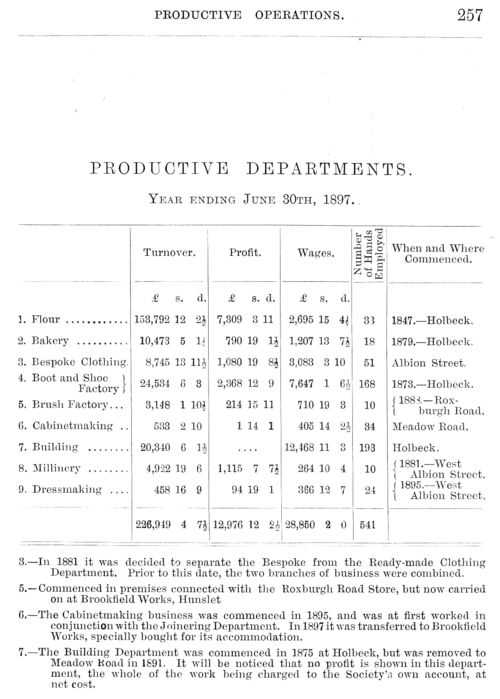
Characteristics of the Society.
――♦――
CHAPTER XVII.
THE story of
these pages has been ill-told if characteristics of the Society are
not already conspicuous, yet some merit a final enumeration.
For instance—it was given in Parliamentary evidence (1856) that the
Society could have undersold its adversaries, the millers, and make
a large profit and did not do it; principle stood first in their
minds and commercialism second. Their object was to benefit
the members, not to destroy others.
The majority of the early members were unable to tell good
flour from bad, and rather preferred the bad, as was often proved in
the objections they made to the good. The directors could have
fooled them with cheapness and given them fraudulent flour and won
custom by it—and contempt. They did not do this; the directors
stood by the honour of co-operation.
Another thing they did—they gave a higher price for wheat
than any miller in the market did, as they professed to buy the
best, and they did buy it—but it was not "good business," as a late
Royal Commission was told, but it was good faith. In the long
run good faith paid; it gave the Society an honest reputation, which
means money. Dr. Braithwaite, who was for many years a member
of the Society, said on one occasion, "I always recommend my
patients to purchase their flour from the Co-operative Society; it
is the best flour in Leeds; it is always used in my family."
Wood and Holdsworth, for many years the principal firm of
billposters in the city, used the Society's flour in their business.
Another billposter one day said to Mr. Wood, "Where do you purchase
your flour for making paste?" "We buy from the Co-operative
Society," he replied. "I can tell" said his friend, "where you
can buy flour, for making your paste, a good deal cheaper."
"We have tried it," said Mr. Wood, "but we find co-operative flour
the cheapest; it makes a lot more paste, and it sticks a good deal
better."
Thus, if the Society needed to rely on "testimonials," as
some tradesmen do, it could have had telling ones, which everyone
could know to be genuine.
Another feature, which belongs to the Society alone, is the
existence of local committees in connection with each grocery
branch, which were, for a long period, the only propagandist agency,
in addition to the board of directors, possessed by the Society.
These committees, directors, and presidents are elected at ward
meetings, invented in 1858. The term "ward" was borrowed from
municipal or Parliamentary bodies, but used as a term of
co-operative organisation, signifying the divisions in which
periodical assemblies of local committees took place. In 1870,
notices appeared of thirty-one ward meetings, and thirty-one halls
or rooms in which they were all held on the same night. The
custom continues, though the number is greater now.
Leeds is the only co-operative society which in its early
days took, in its certified rules, power to fine irrepressible
orators, which showed that the Leeds Pioneers were conscious of
being in an animated community. Emergencies arose, as we have
seen, which justified the precaution. Yet stormy meetings are
not always evil, inasmuch as they show interest in the affairs of a
society. An inquiring mind alone gains knowledge. The
evil is when members act on suspicion or conjecture. To put
forth suspicions as facts is unfair, since it misleads and imposes
upon half-informed members; but abuse of opportunity does not
invalidate its use, and irregular inquiry should be put down
charily. When questioning is discouraged and vigilance ceases,
a society dies; for apathy is death. Democracy is always a
trouble, but democracy is education and life and independence.
Despotism is the rule of the few, and creates the foolishness of the
many.
One novelty, not peculiar to Leeds, but at times more
conspicuous there than elsewhere, was that members who had meekly
stood at shopkeepers' counters, paying what they were charged, for
food which could not be trusted, and against which they had no
protection, and never getting any dividend upon their purchases, had
been abjectly silent—but when the devotion and sagacity of store
directors had given them honest commodities and profit, they were
blusterous, open-throated, noisy, violent, imputative, and
offensive, requiring the police to keep them in order. But
wise patience overcame refractoriness. Co-operation at least
has had this merit—it has taught workmen of the roughest class to
behave like gentlemen.
There have been honourable contests for principle in other
societies, but in no co-operative stores have they been so often
renewed as in Leeds. In three cardinal things the supremacy of
the Leeds Society is indisputable—its great extent, its great
revenue, and the originality of its organisation.
_________________________________
Footnotes.
1. The Hull Co-operative Corn
Mill of the last century, bore the name "Anti Mill" for the same
reason probably. The Benyon men may have heard of it.
2. Recently demolished.
3. A dubious reptile of that
colour. Its name was given to uncertain American politicians
who professed to be for the Union but argued against it.
4. From an old minute book in
possession of the Society.
5. There is another edition of
the rules purporting to be printed "by Joseph Barker, printer and
publisher, Wortley," bearing the same date, "July, 1847."
6. Varied by a white earth known
as "terra alba."
7. The doctor's best patients
were probably among the middle class of shopkeepers, who would be
likely to keep clear of his consulting room. It was given in
evidence before the Parliamentary Committee of 1856 that the
shopkeepers held together against any assailant.
8. This was Archbishop Whately's principle, who said, "It makes all the
difference in the world whether we put Truth in the first place or
put it in the second place."
9. This is the only instance in
which the private business of a group of leaders is given, showing
their position in society; useful to know to-day.
10. The members were Messrs. Jones
(chairman), Sands, Bailey, Shaw, Speed, Watson, Johnson, and Samuel
Gaunt, whose name "Samuel" was given probably to distinguish him
from another Gaunt in the Society.
11. The Leeds Society was in the
same condition as Mr. Emmerson owned to the Committee. Had
members or enemies had wit or malice sufficient, they might have
destroyed the business any day. A secretary of a Manchester
Friendly Society, named Radcliffe, took £4,000 of members' money.
The magistrate dismissed the charge of robbery on the ground that he
was a member, and a member was a partner.
12. Visit to a Strange Treasurer
of Garibaldi. "Sixty Years of an Agitator's Life."
Chap. LXXVI.
13. Mr. Gaunt cannot be traced beyond
1853, neither can it be said who was secretary from that time to
1856.
_________________________________ |